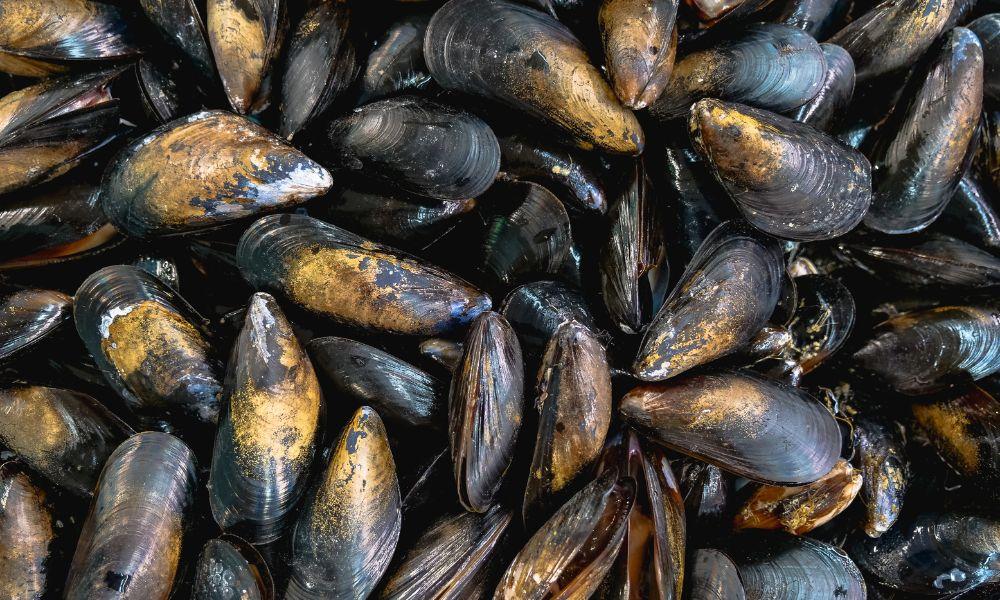Mussels are popular seafood delicacies that are enjoyed by many for their unique taste and texture. Coming in various types and sizes, such as green mussels and black mussels, these bivalve mollusks are wonderful additions to numerous dishes. If you’re interested in learning more about the differences between mussels and their fellow shellfish, clams, check out our comparison article here.
However, the culinary appeal of mussels greatly depends on their freshness and how they are stored. This article will dive into the essential tips for extending the shelf life of mussels in the fridge, ensuring the best possible taste and quality for your next seafood feast.

Factors Affecting Mussel Shelf Life
One of the most common questions we receive is, “how long can you keep mussels in the fridge?” Before we answer this, it’s important to understand the key factors that influence their shelf life:
- Freshness: Mussels should be bought as fresh as possible, preferably live. The fresher your mussels are, the longer they will last in your fridge.
- Quality: Look for mussels that have tightly sealed shells, show no signs of damage, and have a pleasant, fresh aroma.
- Storage Conditions: Proper storage techniques play a significant role in extending the fridge storage life of mussels. This includes temperature, humidity, and ventilation.
Understanding Mussel Shelf Life
The typical shelf life of fresh, live mussels is 1 to 2 days in the fridge. But with proper storage, you can extend their freshness. The following tips will guide you through optimal storage techniques, from selecting the freshest mussels to preparing and storing them in your fridge.
Optimal Storage Techniques

1. Buying Fresh Mussels
When choosing mussels, there are a few indicators of freshness and quality to look for:
- Visual: The shells should be completely closed or slightly open, shiny, and free of cracks or damage. Fresh mussels will close when lightly tapped.
- Aroma: Fresh mussels will have a light, briny scent reminiscent of the ocean. Any strong or fishy odors are signs that the mussels may be past their prime.
For more information on the differences between green mussels and black mussels, check out our comparison article here.
2. Pre-Storage Preparation
Before storing mussels, a little preparation is required:
- Cleaning: Rinse the mussels under cool, running water to remove dirt and debris. Use a clean scrub brush or your hands to gently scrub away the grime from their shells.
- Debearding: Some mussels may have a small “beard,” or byssus, protruding from their shells. To remove it, grasp the beard firmly with your fingers or a pair of pliers and pull it towards the hinge of the shell. This requires a bit of force, and it’s normal for the beard to break. If it does, simply remove any remaining pieces with your fingers or pliers.
Once your mussels are clean and debearded, it’s time to store them in the fridge!
3. Storage Containers
The ideal container for storing mussels in the fridge should provide proper ventilation and moisture control. A good option is a large, shallow bowl or tray with a layer of damp (not wet) paper towels or a clean cloth at the bottom. This will help maintain the right amount of moisture while allowing excess liquid to drain away.
Place the mussels in a single layer on the damp cloth or paper towels, then cover them with another layer of damp material. Avoid piling the mussels on top of each other or using a sealed plastic bag, as this can suffocate them and lead to spoilage.
4. Temperature and Humidity
The optimal temperature for storing mussels is between 32°F and 40°F (0°C to 4°C). This is typically the coldest part of your fridge, so placing the mussels at the back of the bottom shelf should provide the best conditions. Avoid storing mussels in the fridge door, as this can expose them to fluctuating temperatures, affecting their freshness.
In addition to temperature, maintaining the right humidity level is crucial for preserving the quality of your mussels. The ideal humidity is around 90% to 95%. If your fridge doesn’t have a built-in humidity control, you can use a hygrometer to monitor and adjust the conditions.
Storing Cooked Mussels
Cooked mussels should be stored in airtight containers with a firm seal to prevent the absorption of odors from other foods in the fridge. It’s recommended to consume cooked mussels within 3 days.
Additional Storage Tips and Tricks

To further enhance your mussel storage game, here are some extra tips and tricks that can make a valuable difference:
1. Discarding Dead Mussels
When preparing your mussels for storage, it’s crucial to discard any dead ones. As mentioned earlier, if a mussel’s shell is open and does not close when lightly tapped, it may be dead and should not be consumed. Also, note that closed shells do not guarantee that the mussel is alive; if the shell is lightweight and doesn’t make a sound when shaken, it may be empty and should be discarded.
2. Regularly Check Your Mussels
Check on your mussels daily to ensure their continued freshness. If you find any with open shells, give them a gentle tap – if they don’t close, discard them. Maintain the dampness of the paper towels or cloth, adjusting as needed to avoid making them too wet.
3. When in Doubt, Throw Them Out
Remember the adage – when in doubt, throw it out. If a mussel smells off, has an open shell that doesn’t close when tapped, or feels unusually heavy or light, discard it. It’s better to be safe than to risk consuming spoiled mussels.
4. Know Your Mussel Type
As previously mentioned, green mussels and black mussels have some differences. Be sure to know the specifics of the mussels you have purchased and follow any storage guidelines specific to their type. If you need a refresher on their differences, revisit our comparison article here.
Recipes and Cooking Tips for Fresh Mussels

Now that you’re a mussel storage pro, it’s time to get creative in the kitchen! Here are some ideas and suggested recipes for your fresh mussels:
- Moules Marinières: A classic French dish featuring mussels steamed in a white wine and garlic sauce. Served with crusty bread, this dish is perfect for a cozy evening at home.
- Mussels in Tomato Sauce: Combine your mussels with a tangy, garlicky tomato sauce for robust flavors that complement the tender, juicy morsels.
- Thai Green Curry Mussels: Spice things up by simmering your mussels in a fragrant Thai green curry sauce. The marriage of flavors between the mussels and the creamy, spicy sauce is truly delightful.
- Beer-Steamed Mussels: Instead of white wine, try steaming your mussels in a flavorful beer, such as a Belgian ale or a hoppy IPA. The result is a unique and satisfying taste that pairs well with the briny mussels.
For a fun culinary experience, don’t be afraid to experiment and create your own recipes!
FAQs
How long can you keep live mussels in the fridge?
Live mussels can typically last 1-2 days in the fridge when stored properly, as discussed in this article.
Can you store mussels in water in the fridge?
Mussels should not be stored in water, as it can suffocate them and cause them to spoil. Instead, store them on a bed of damp paper towels or a clean cloth, as described above.
Can you freeze mussels for longer storage?
Yes, you can freeze mussels to extend their storage time. Cooked mussels can be frozen in their cooking liquid or a sealed container, while live mussels can be shucked and frozen in their own juice. Prior to freezing, make sure they are clean and debearded. For best results, thaw frozen mussels in the refrigerator before using them.
How do you know if mussels are bad or spoiled?
Bad or spoiled mussels will have a strong, fishy smell and may have broken shells, indicating they are no longer fresh. Additionally, if a mussel’s shell remains open even after being lightly tapped, it may be dead and should not be consumed.
Can you store mussels in a sealed plasticbag in the fridge?
It’s not recommended to store mussels in sealed plastic bags, as they need proper ventilation to stay fresh. Instead, use the storage techniques described above, such as using a shallow container with damp paper towels or a cloth.
Conclusion
By implementing the storage techniques and tips shared in this article, you will not only extend the life of your mussels but also ensure that they remain fresh and flavorful. Whether you fancy green mussels, black mussels, or any other variety, proper storage is pivotal in creating an exquisite culinary experience worthy of remembering.
As always, remember to prioritize safety while cooking and handling seafood, and discard any suspicious mussels. With these expert tips and best practices at your disposal, you’re well on your way to becoming the ultimate mussel connoisseur.
References
- Harvard University. (n.d.). Food Safety: Storing.
- Marine Stewardship Council. (n.d.). How to Store and Prepare Mussels.
- National Oceanic and Atmospheric Administration. (n.d.). Safe Handling of Seafood.
- New Zealand Food Safety. (n.d.). Storing Cooked Mussels.
- Pennsylvania State University Extension. (n.d.). Storing Mussels.








